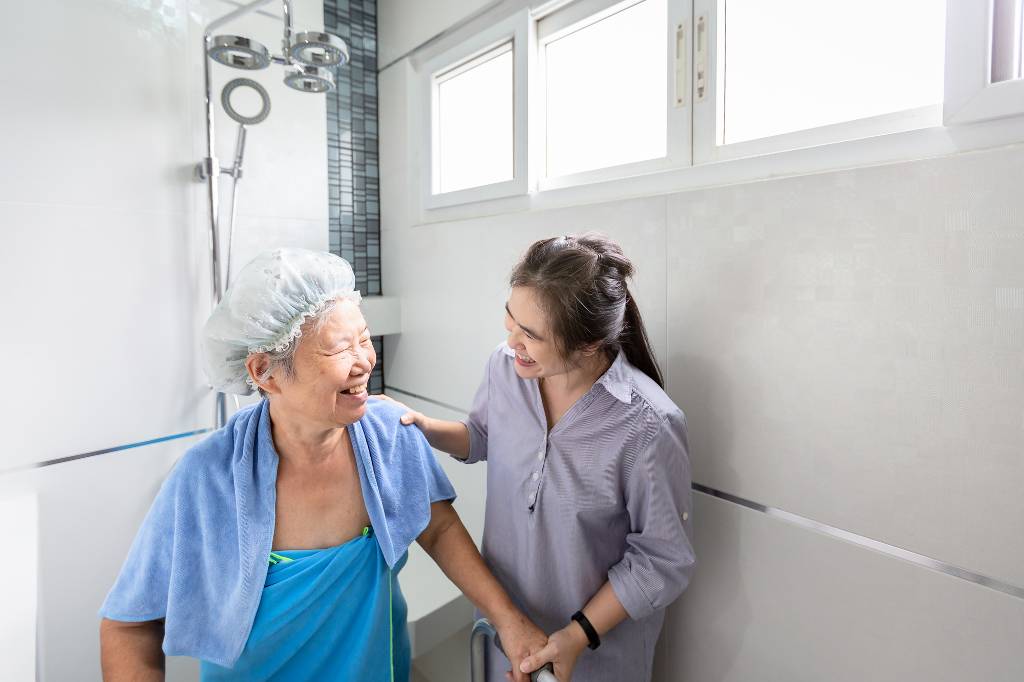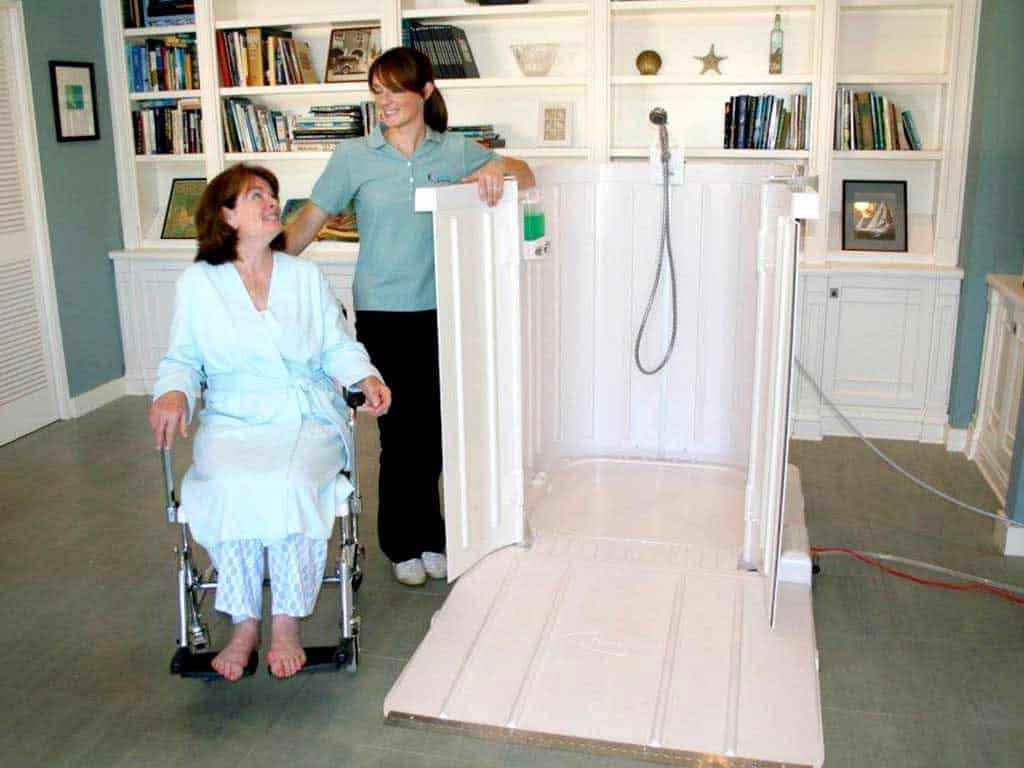Making Bath Time Safe and Comfortable for Elders with Dementia

Dementia refers to a wide range of conditions, such as Alzheimer’s disease, that alter brain function. Sufferers are known to endure memory loss as well as problems with speech, thoughts, and physical activity. Moreover, dementia is known to cause mood swings. Understandably, caregivers of people with dementia face uphill battles.
In the United States, an estimated 6.7 million aging individuals aged 65 years or older are living with Alzheimer’s disease in 2023. Medical News Today reported that the Alzheimer’s Association estimates that Alzheimer’s disease accounts for 70-80 percent of all cases of dementia. The responsibility of caring for these loved ones can be an eye-opening challenge, particularly when dealing with personal hygiene and bathing routines. This article will help guide caregivers in creating a safe and comforting bath experience for elders with dementia.
The Bathing Process Can Be Especially Difficult
As Carol Bradley Bursack explains on AgingCare.com, the memory loss suffered by dementia patients can lead them to believe they just showered when, in reality, they haven’t bathed in weeks. As a possible solution for caregivers, she suggests offering care recipients incentives for taking their baths.
“If you feel that the reason a senior isn’t bathing is that they think they’ve already done it, or they just don’t see the importance of it, try associating the process with something they enjoy,” Bursack advises, “Give them a fun incentive to cooperate. For example, say, ‘Let’s both get cleaned up, and then we’ll go to your favorite restaurant for lunch.’”
Dementia-Friendly Approaches To Bathing

A dementia-friendly approach to dementia services involves a lot more than simply catering to the physical needs of individuals who are contending with the condition. It’s an approach to providing care that involves as much attention to a patient’s emotional well-being as it does to his/her physical needs.
Establish a Daily Routine
Because memory loss is such a common symptom of dementia, it’s important to create a routine. Each day should involve some planned repetition to help the dementia patient in your life recall their daily requirements. This involves the morning routine, of course. Making breakfast together might be a great way to indicate the beginning of each day. Mayo Clinic encourages caregivers to schedule wisely.
“Some tasks, such as bathing or medical appointments, are easier when the person is most alert and refreshed,” says the site, “Allow some flexibility for spontaneous activities or particularly difficult days.”
Make the Bathroom Warm and Comfortable
Do you enjoy removing your clothing in a cold room? No one does. It’s important to remember that your elderly loved one is likely more sensitive to the cold than you are. Not only should you ensure that your home’s temperature is warm enough for him/her, but you should also make sure the bathwater temperature is just right. As DailyCaring.com points out, many seniors don’t like to bathe because they associate it with being cold and shivering.
“5-10 minutes before they enter the bathroom, turn on a space heater to make the bathroom nice and warm,” the website advises, “If you’re a bit hot and sweaty, that’s probably a good temperature. Lay a towel on the chair or toilet seat where they sit to take off their clothes so it won’t feel cold and hard. You might even want to play soft, soothing music to create a serene, spa-like atmosphere.”
Be Very Communicative
Never forget the importance of an older person’s mental and emotional well-being. Especially when he/she is contending with dementia, it’s very important to be as communicative as possible. Ask your care recipient if he/she would rather have a bath or a shower. Also, ask if he/she would prefer to bathe right away or in about 15 minutes or so. You want to assure your elderly loved one that he/she still maintains some control over his/her life.
You also want to be mindful of the fact that the entire bathing process may be perceived as threatening, says the Alzheimer’s Association. “Have activities ready in case the person becomes agitated,” their website advises, “For example, play soothing music or sing together. If the person resists bathing, distract him or her and try again later.”
Use a Pre-Existing Opportunity to Begin the Bathing Process
Another dementia-friendly approach to bathing care recipients is to begin the process at a time that is most convenient for them. Are they cranky in the morning? If so, perhaps it’s best to wait until later in the day. Are they particularly fatigued before bed? Maybe morning baths are better options.
The Family Caregiver Alliance suggests that you try to bathe your dementia patients shortly after they begin undressing for other reasons, such as when someone is sitting on the toilet and has clothes partly off anyway. “Or in the morning when changing out of sleeping clothes,” they continue on their website, “However, sometimes you will be more successful if you wait until the afternoon when you might not have other things to do, and you can approach bathing in a slower, calmer manner.”
How To Care For A Loved One With Dementia
Because dementia can change a person’s personality and behavior, it’s important to exhibit a lot of patience and understanding. Let’s discuss a few key ways to care for a loved one with dementia adequately.

Set a Positive Mood for Interaction
Your tone of voice can go a long way in making or breaking the mood of an individual with dementia. It’s important to remember that the sufferer’s brain function is impaired. As a result, they may not adequately understand what you’re saying. This is why slow, soft, and gentle is the appropriate approach when speaking.
“Your attitude and body language communicate your feelings and thoughts more strongly than your words do,” informs Caregiver.org, “Set a positive mood by speaking to your loved one in a pleasant and respectful manner. Use facial expressions, tone of voice, and physical touch to help convey your message and show your feelings of affection.”
Always Protect the Person’s Dignity and Privacy
Let’s be honest. No one really wants help in the shower. When you’ve reached the stage of your life where assistance with bathing is necessary, it’s a very difficult time. Your privacy goes out the window and often, so does your dignity. As a caregiver, it’s mandatory you bear this in mind. Do your best to protect your care recipient’s dignity and privacy during bath time.
“Try to help the person feel less vulnerable by covering the person with a bath blanket while undressing,” suggests the Alzheimer’s Association, “Let the person hold a towel in front of his or her body, in and out of the shower or tub, to help ease anxiety.”
Get the Family Involved in Group Activities
People who have dementia often bear the brunt of loneliness. This is because they tend to isolate themselves by either keeping to themselves or shutting others out. Remember that mood swings result from dementia. Do your best to lighten the mood and boost the morale of your care recipient. Naturally, you may need a little help with this. Encourage your family members to engage in activities that everyone can enjoy, including those with dementia.
“Help get an activity started or join in to make the activity more fun,” suggests Alzheimers.gov, “People with dementia may lack interest or initiative and can have trouble starting activities. But, if others do the planning, they may join in.”
Tips to Help Improve Memory for Seniors

There are a number of ways to assist older adults with their memory. Doing so can lead to improved hygiene.
Eat A Nutritious Diet
Healthy eating can be found on practically every single “how to live healthier” list that exists. It will not be left off of this one. Surely, you’re aware that getting your fill of fruits and vegetables each day is a vital part of healthy living. It can improve your memory too. Ruby Cemental of Caring Senior Service reports that artery-clogging foods such as beef, steak, dairy, and fried foods are detrimental to both the heart and the brain.
“Changing a senior’s diet to foods that are high in mono- and polyunsaturated fats, such as fruits, vegetables, nuts, fish, and olive oil, will increase levels of HDL cholesterol (the good kind),” she explains, “This will prevent blood vessels from getting clogged or damaged and reduce the risk of memory loss and stroke.”
Engage in Brain Games
Playing board games has long been a fun activity. Pulling them out for family night events is an excellent way to get all household members engaged. For seniors, such games also help to improve cognitive skills. Brain games are especially recommended for older adults battling dementia. They include such “thinkers” as crossword puzzles, word searches, and Sudoku.
“If we don’t stimulate and challenge our brains with new information, eventually this vital organ will deteriorate,” stresses Home Care Assistance, “Research on brain plasticity shows that events and information stimulate neurons. By providing your brain with the appropriate stimulus, you can counter degeneration and memory loss. Stimulating brain games for seniors promote cognitive health and strengthened memory.”
Become More Active
The simple act of getting up out of your seat and walking around can improve both your physical and mental health. Cemental notes that physical exercise improves mood by supplying endorphins. It also provides opportunities for social interaction. This, of course, can improve memory, as evidenced by the results from a study conducted by the Center for Brain Health at The University of Texas at Dallas.
It “showed that seniors who engaged in physical activities such as using a stationary bike or treadmill for only 1 hour 3 times a week for twelve weeks resulted in higher resting blood flow to the brain,” Cemental reports, “Improvements in mental health were seen in as few as six weeks as there was an increase in blood flow to areas of the brain associated with improved memory.”
Conclusion
Caring for an elder with dementia might be challenging, but with effective strategies, it’s manageable. By focusing on the comfort and safety of the individual during bath time, the caregiver can transform this mundane task into an opportunity for emotional connectivity, reinforcing trust and, ultimately, improving the elder’s quality of life.
Dementia-Friendly Shower for Seniors

When Forward Day came up with the Shower Bay portable shower, we had people with dementia in mind. We believe that Shower Bay helps make bathing a lot safer for those with dementia. For more information about these revolutionary portable showers, which can be snapped together in any room of the home where a faucet is nearby, please don’t hesitate to give us a call at 1-877-593-4461. You may also email us at info@showerbay.com.




